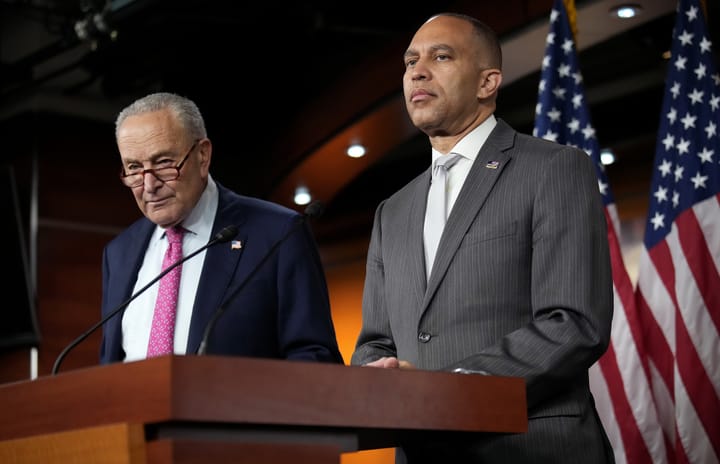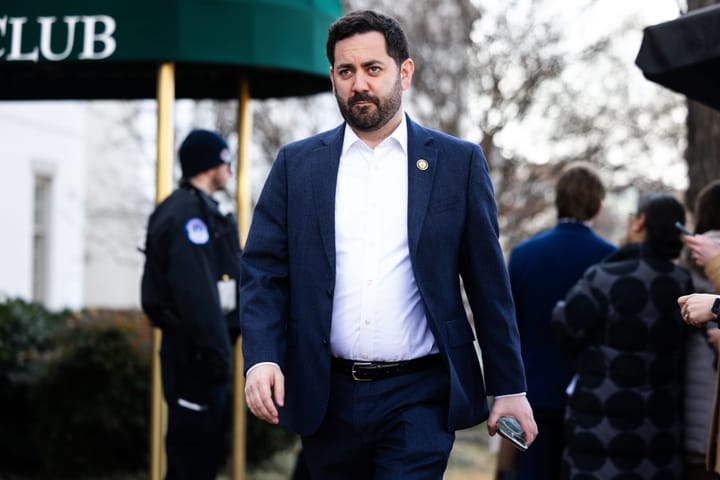The United Democracy Project (UDP), the super PAC of pro-Israel lobbying group the American Israel Public Affairs Committee (AIPAC), raised more than $1.8 million in March, according to a new filing with the Federal Election Commission. The UDP, which has nearly $33.4 million cash on hand, is a main spending vehicle in AIPAC’s plan to shell out $100 million this year opposing candidates who criticize Israel’s war on Gaza.
Also in March, AIPAC’s PAC made a record high $4.1 million in contributions to scores of congressional lawmakers and federal candidates, making up the bulk of its $4.3 million in spending last month, according to a FEC filing released yesterday. The top two recipients of earmarked contributions through the PAC during the period, according to a review of FEC data, were AIPAC-endorsed challengers to progressives: Westchester County Executive George Latimer, who received $909,000 in his run against Rep. Jamaal Bowman in New York; and attorney Wesley Bell, who received $387,000 in his race against Rep. Cori Bush in Missouri. Overall, AIPAC’s PAC received $3.8 million in March, an increase over the prior two monthly reports.
This month, UDP rolled out a spending barrage in the crowded Democratic primary in Maryland’s Third Congressional District: nearly $1.9 million supporting Maryland state Sen. Sarah Elfreth. UDP is virtually the only outside spending group to hop into the race.
Of that amount, UDP spent more than $1.7 million on media production and placement for Elfreth, more than five times the amount Elfreth’s campaign has spent overall through March. UDP has also spent $115,500 on direct mail and $50,000 for phone calls for Elfreth over the past two weeks.
In the field of 22 Democratic candidates, one of Elfreth’s rivals is former U.S. Capitol Police Officer Harry Dunn, who became a national figure after defending the Capitol on Jan. 6, 2021. Dunn has outpaced Elfreth in both fundraising and campaign spending, with total disbursements of $2 million through the end of March.
Elfreth told Jewish Insider she does not favor conditions on aid to Israel; Dunn also rejected conditions on aid to Israel, according to non-public position papers viewed by HuffPost and by Politico.
Another candidate in the Maryland primary is labor lawyer John Morse, who has been outspoken on the human toll of Israel’s military action in Gaza—prompting political observers to suggest to HuffPost that UDP’s spending behind Elfreth is intended to squash the Bernie Sanders-endorsed Morse. Early voting in the Maryland contest to replace Rep. John Sarbanes, who announced last year he was not standing for re-election, runs from May 2-9, and the state’s Primary Election Day is May 14.
Earlier this month, Dunn fired back at UDP’s announcement that it would spend on ads in the primary, denouncing “the intrusion of a MAGA Republican-funded super-PAC into the race,” and calling on every candidate in the race to reject UDP’s spending. In a press release, Dunn highlighted the hefty contributions that UDP has received from backers of Donald Trump, like billionaire GOP megadonor Bernie Marcus, and donors to Ted Cruz, like entrepreneur David Zalik.
Yesterday, Jewish Insider reported that at a candidate forum, both Elfreth and Dunn said they would support efforts from Maryland Democratic Sen. Chris Van Hollen to require that the weapons received from the U.S. are used in accordance with U.S. law, international humanitarian law, and the law of armed conflict. Both Elfreth and Dunn’s campaigns told the outlet they believe Israel to be acting in accordance with armed conflict laws, so in their views aid to Israel would not be affected.
In March, UDP spent half a million dollars attacking progressive Kina Collins, a gun violence prevention advocate who mounted a second consecutive challenge to Democratic Rep. Danny Davis in a district on the West Side of Chicago. In an October statement, Collins condemned Hamas’ attack and decried Israel’s “war crimes” against the Palestinian people, such as cutting off food and water supplies, calling for a ceasefire.
In the primary election held March 19, Davis defeated a field of challengers including Collins and Chicago City Treasurer Melissa Conyears-Ervin, both of whom slightly outraised the longtime incumbent in campaign contributions. UDP’s ads attacking Collins focused not on aid to Israel, but on a radio interview statement she made in the summer of 2020 calling to cut funding for Chicago police.
Jumping into a Republican primary, UDP this month has also spent over $500,000 to oppose former Republican Rep. John Hostettler in Indiana, in a race for an open seat after Rep. Larry Bucshon’s announcement that he will retire from Congress. UDP’s ads go after Hostettler for voting against a resolution in 2000 expressing support for Israel, along with other votes on military aid to Israel.
UDP’s Latest Donors
Investment industry donors led the way in the March monthly FEC filing for UDP. The group’s largest donor last month was Los Angeles-based theatrical producer Linda Rubin, who listed her occupation as “self-employed / investor.” Rubin donated $250,000 on March 1, matching the amount she gave to UDP in April 2023. In L.A., the Broadway producer leads Linda B. Rubin Productions, which describes itself as combining her philanthropic and theatrical efforts.
Michael Sacks, chairman and CEO of Chicago-based alternative asset management firm GCM Grosvenor, also donated $250,000 on March 1. Sacks has been a large donor to Democratic Party groups this election cycle, giving more than $1 million combined to super PACs the Senate Majority Project (SMP), House Majority Project (HMP), and the Biden Action Fund joint fundraising committee, according to FEC records. Since 2016, Sacks has been a director of the Obama Foundation. His firm is a member of trade group the Managed Funds Association (MFA), whose CEO warned congressional Democrats in 2022 against proposals addressing the “carried interest loophole” used by wealthy investment managers to lower their taxes.
Richard Pzena, founder and CEO of Pzena Investment Management, donated $150,000 to UDP on March 15 after having given the same amount in May of last year. A campaign donor to both sides of the aisle in the past few years, Pzena contributed $26,000 to Republican presidential candidate Nikki Haley’s joint fundraising committee Team Stand for America, $10,000 to the pro-Haley super PAC SFA Fund, and maxed out to her campaign with $13,200.



